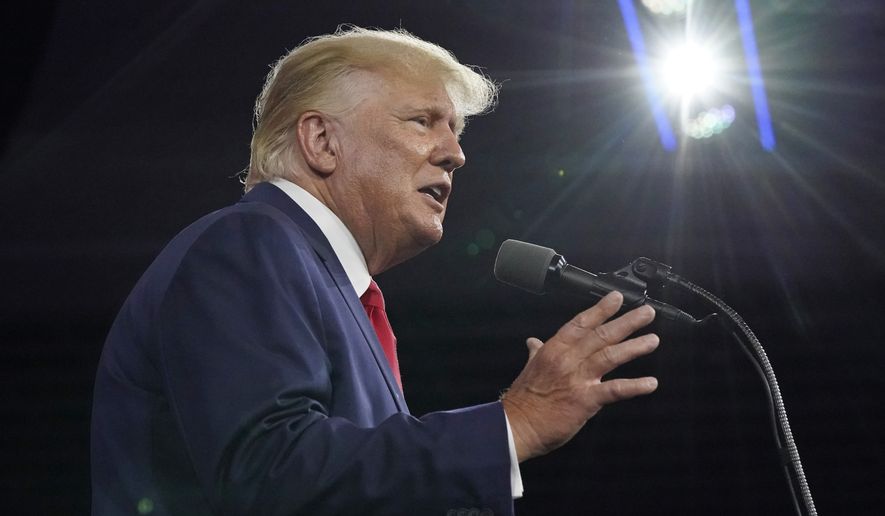A nonprofit group led by several allies of former President Donald Trump has launched an “election integrity” interactive map showing which states have enacted strong ballot-security laws and which ones haven’t adopted such measures, including voter ID.
The Center for Election Integrity, part of the America First Policy Institute, says 27 states including the perennial battlegrounds of Michigan, Nevada, Ohio and Pennsylvania, lack adequate protections against cheating. These states, coded in red, don’t require voter ID, fail to prevent so-called ballot harvesting and don’t require ballots to be returned to election officials by Election Day.
The group told The Washington Times exclusively that it is using the new tool to educate voters about their states’ election vulnerabilities and to promote stronger election-integrity measures.
The digital report card also evaluates states’ positions on what the group calls “Zuckerbucks,” a reference to election money donated by Facebook founder Mark Zuckerberg that a Wisconsin investigation recently determined to be a form of pro-Democratic bribery.
Eight states coded in green, with the strongest election-integrity measures, are Alabama, Arkansas, Georgia, Indiana, Kansas, Louisiana and Missouri, the group said. Fifteen other states are placed in a yellow category of having taken some positive steps but needing to improve their election rules.
“It is astonishing to see just how many states don’t have laws in place that protect every legally cast vote and every legal voter,” said Hogan Gidley, director of the Center for Election Integrity. “When you consider how popular election integrity measures are with a vast majority of Americans, working to ensure free, fair, and honest elections is good politics and good policy.”
He said there are roughly 700 election proposals pending in state legislatures, and the online map “will help educate everyone as to the laws a state has and needs moving forward.”
“We’d like to see them pass some of these key measures,” Mr. Gidley said. “We’d like to see some of these governors sign them in the law, because one illegal vote is one too many.”
Former Ohio Secretary of State Ken Blackwell, chair of the center, said of the project, “The goal is simple. Make it easy to vote and hard to cheat.”
“Every American should look at this map and click on their state to see if they have laws in place that ensure safe, secure elections,” Mr. Blackwell said.
The project tells voters where their states stand on “Zuckerbucks.” For example, the group says eight states have outlawed such outside funding for state election systems: Arizona, Georgia, Idaho, Kansas, North Dakota, South Dakota, Tennessee and Texas.
A state-appointed special counsel’s investigation in Wisconsin reported last week that Mr. Zuckerberg and wife Priscilla Chan gave nearly $9 million in grant funds directed solely to five Democratic stronghold counties, an effort that violated the state election law’s prohibition on bribery.
The report found that the money provided financing that allowed the Center for Tech and Civic Life to offer nearly $9 million to Milwaukee, Madison, Racine, Kenosha and Green Bay counties, which operated Democratic get-out-the-vote efforts. The grant funds paid for illegal drop boxes to be placed in Democratic voting strongholds, the report found.
“For the first time in 2020 we saw non-profits injecting millions of dollars into targeted cities in battleground states, with the stated purpose of helping pay for COVID protections,” Mr. Blackwell said. “But we now know that money was used to increase voter turnout, targeted toward specific voters in only certain areas and certain communities and not others. These dollars have become known as Zuckerbucks and should be outlawed. States that have laws on the books that ban Zuckerbucks were given a higher ranking.”
AFPI is staffed with several Trump alumni. Its CEO, Brooke Rollins, is a former head of the Trump White House Domestic Policy Council. Mr. Gidley is a former spokesman for the Trump White House and for the 2020 reelection campaign.
After losing the 2020 election, Mr. Trump vowed to promote efforts to beef up states’ election-integrity laws. Several Republican-led states have adopted measures including the requirement of voter ID, a move opposed by most Democrats.
Congressional Democrats, meanwhile, have tried but failed to pass a sweeping voting-rights measure that would establish national standards for state elections.
Mr. Blackwell said in a video on the group’s website, “The last thing that we need is the federalization of our election system.”
Mr. Gidley said election integrity “is the No. 1 polling issue we see.”
“This is a unique convergence of good policy and good politics,” he said. “The Constitution gives the right and responsibility to decide the manner in which a state conducts an election to state legislatures. The ball is clearly in their court to listen to an overwhelming majority of their constituents who want laws on the books that make it easy to vote and hard to cheat.”
• Dave Boyer can be reached at dboyer@washingtontimes.com.




Please read our comment policy before commenting.